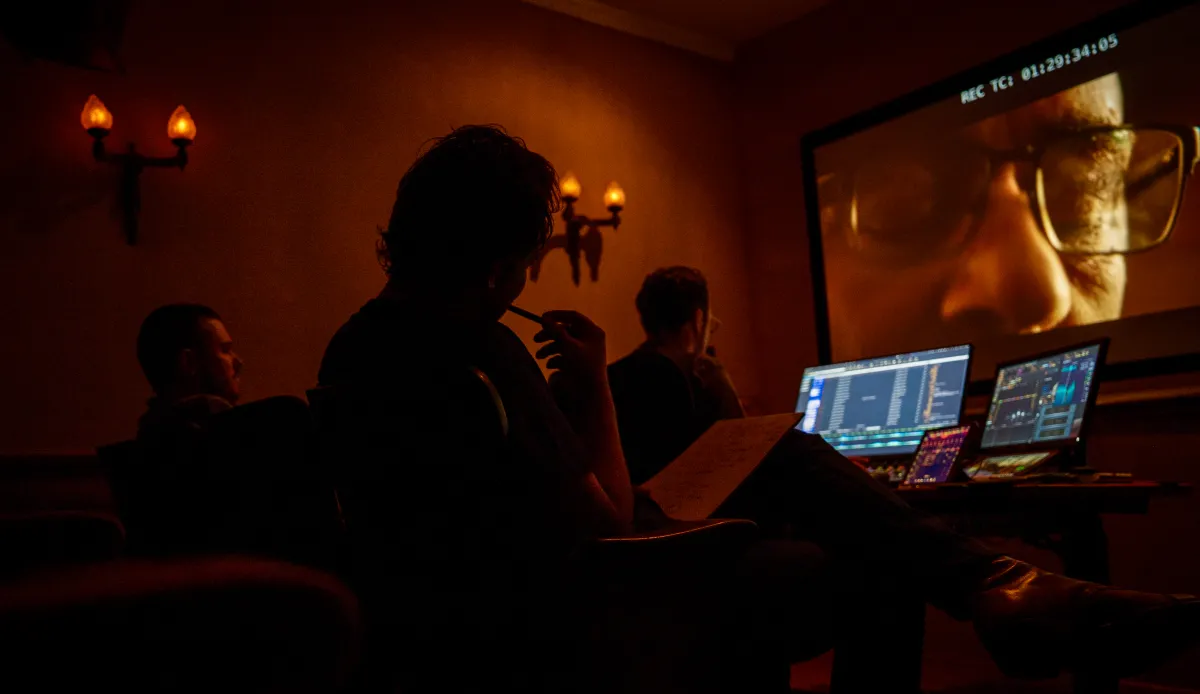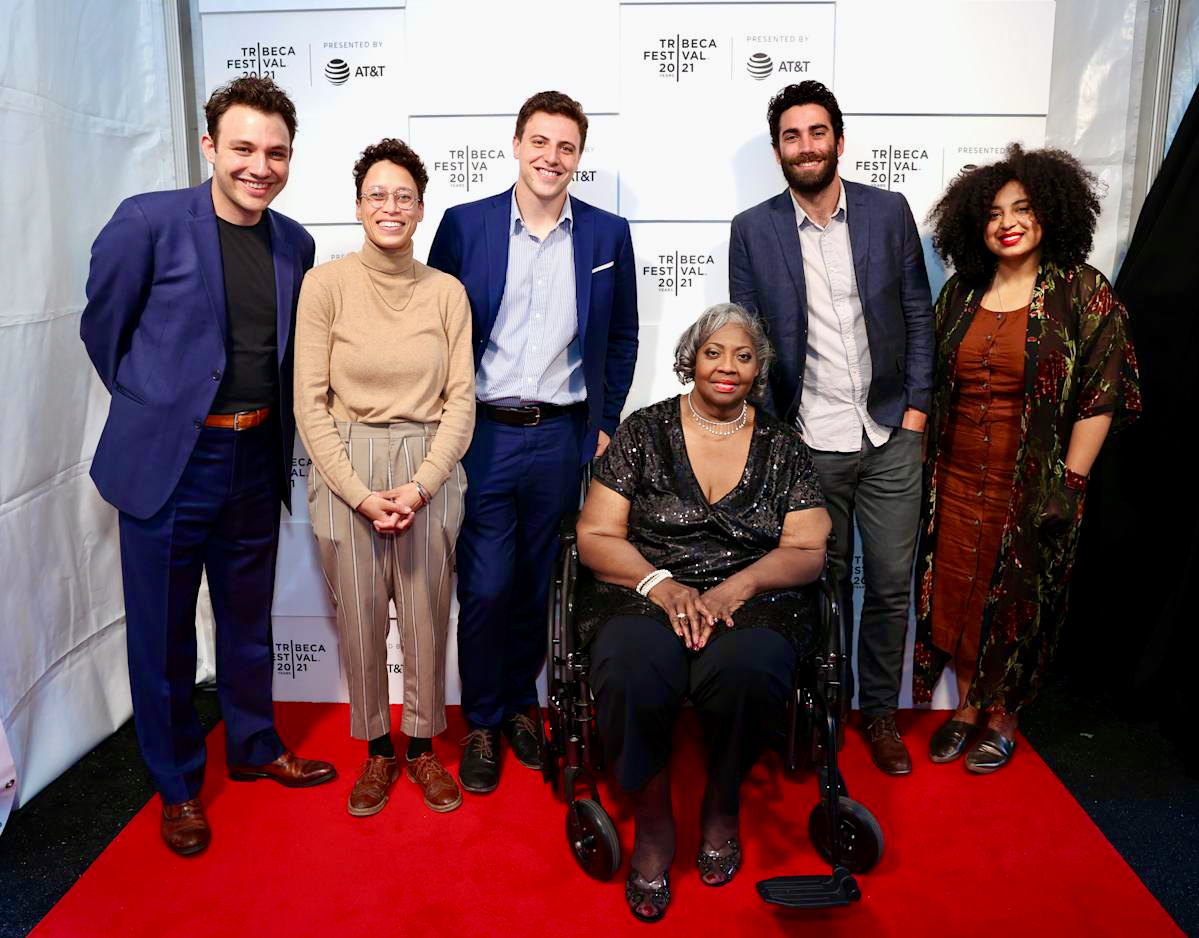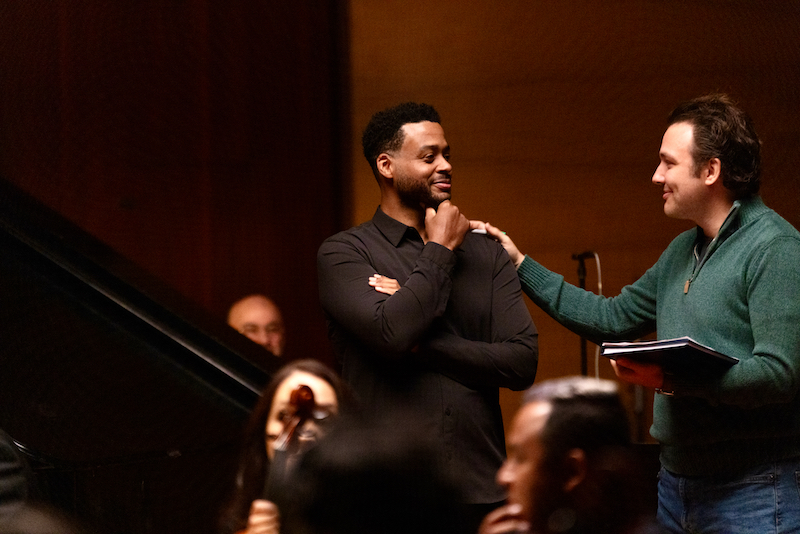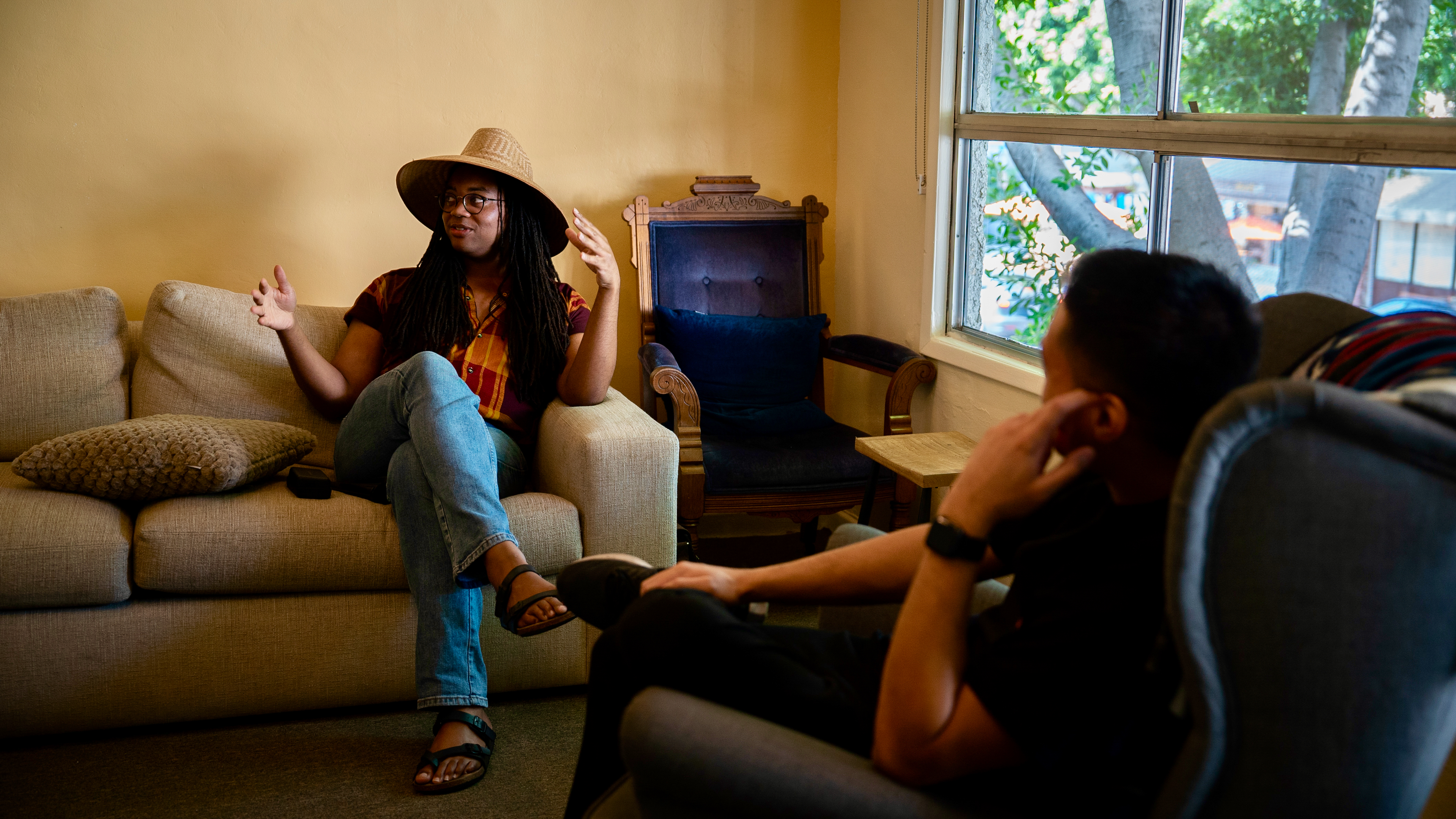

Ben Proudfoot and longtime collaborators Nick Wright, the editor, and supervising sound editor Sean Higgins review an initial mix of ‘The Last Repair Shop’ in Breakwater's handsome 5.1 dub stage. Photo credit: Jade Crenian
Making a Production is Documentary's new strand of in-depth profiles featuring production companies that make critically-acclaimed nonfiction film and media in innovative ways. These pieces probe the creative decisions, financial structures, and talent development that sustain their work—in the process, revealing both infrastructural challenges and industry opportunities that exist for documentarians.
Fifteen people crowd into the tiny screening room of Breakwater Studios to listen to its founder, Ben Proudfoot, dissect A Concerto Is a Conversation (2021), the 13-minute, Oscar-nominated short documentary he co-directed with composer Kris Bowers. The new and veteran staff members cram the two rows of reclaimed movie theater seats and spill onto a couch and chairs to hear Ben break down his approach to storytelling, part of his continuing effort to ensure his production team understands the principles of a Breakwater film. “How do we feel about Kris here?” he asks about the composer’s introduction in the movie projected on the screen behind him. “What’s the unconscious question we’re planting in the audience’s mind in the very first shot we see of him? What are we promising the audience?”
Like the film—a dialogue between the composer and his grandfather—this is a conversation, not a lecture. The members of his company eagerly respond to the questions Ben poses. Together, they explore the sound, music, composition, color, and editing choices in the documentary, what Ben calls “the attention to all the small decisions that make a good and elegant film.” It’s clear from his hour-and-a-quarter presentation that craft, “the artistry you need to capture what is true and beautiful,” is an essential element of a Breakwater movie. This meticulous attention to detail is one of the reasons the company has been able to thrive in a rapidly changing media environment where movie theaters are closing, studios are making fewer films, and streaming services and cable channels are reluctant to commission documentaries that don’t involve a celebrity or grisly crime.
Ben started Breakwater in 2012, shortly after graduating from USC’s School of Cinematic Arts, where he was a cinema and media studies student, not a production major. A few of his USC friends helped when needed. Ben named his company in honor of a seawall, “a protectorate against the open ocean,” that he and his father built in his native Nova Scotia when Ben was 12. The name also represented his desire to protect the creative process and “the integrity of the stories we tell,” as well as his aspirations for the company. The father-and-son-constructed seawall survived the powerful storms of the Atlantic and so did the fledgling endeavor. Eleven years later, the 32-year-old filmmaker has become the most prominent practitioner of the short documentary film in the U.S., a category that not so long ago the Academy of Motion Pictures was thinking of eliminating. Today, the genre is experiencing an unexpected revival.
“When I started here six years ago, it was just me and four or five guys in their 20s who were friends at USC,” says Dawn O’Keeffe, vice president of finance, whose own children were about the same age. “Today we have a full-time staff of 19 and they look considerably different.”
Dawn attributes the company’s success to Ben’s “unrelenting commitment to excellence and the special quality of the films we do.” Breakwater films have screened at over 130 film festivals, including Sundance, SXSW, Telluride, Tribeca, and DOCNYC, and have been shown on major platforms for short documentaries. The Queen of Basketball (2021), which was widely viewed on the New York Times Op-Docs site, won the Oscar for Best Documentary Short at the 94th Academy Awards, marking the first Oscar for both Breakwater and the Times. The Times pays only a few thousand dollars for the short films it showcases, but the publicity the paper provides, including full-page ads, provides visibility and promotion worth millions. “Breakwater originals are our marketing budget,” says Dawn. “They draw attention from the branded world. But branded content is our bread and butter.”
Fifty years ago, a cartoon or short film often screened before features in movie theaters. They have long since been replaced by ads and coming attractions. Now, the short film is seen as a student format, a test run for a feature. “There’s no longer a tried-and-true distribution path for this kind of film,” says Ben. “So we needed to invent it. In the same way that Pepsi and popcorn have funded the theatrical movie business, our films have been funded by brands who appreciate what we do. When we take on a project that’s funded by a brand, we try to ask ourselves would we tell the story anyway. We can’t always say, ‘Oh, yeah, I would have flown across the country to tell this story,’ but most of the time I can.”

The quality of Breakwater’s original productions is what attracts its paying clients. Charles Schwab, the financial services company, has been commissioning videos from Breakwater since 2014. “We’re big fans,” says Schwab’s chief of staff Greg Gable, who works directly with Breakwater on Schwab’s digitally distributed films. “Several years ago, we did research on what characterized our clients,” says Greg. “We found they’re pretty engaged in life and their investments. We joke that they have one hand on the wheel.” So, Breakwater produced a series of four to five-minute films for Schwab about people who possessed these traits, ending with the Schwab hashtag #ownyourtomorrow. Why Not Now: John Henry, a dynamic portrait of a Harlem entrepreneur who went from doorman to mobile dry cleaner to dealmaker, is typical of these films. “To be an investor, you have to be an optimist and have confidence in the future,” Greg says. “Ben’s stories focus on the significant challenges people face and how they overcome them. He captures the spirit of people engaged in hard decisions in a compelling way. The emotions and values he taps are the values of our company.”
To better serve the companies that hire him, Ben insists on working directly with his clients, with no advertising agency as an intermediary. Eliminating the middlemen also provides more money for the final product. Whether original or brand-funded, Breakwater films display similar qualities that, in fact, make it difficult to tell them apart.
“What makes a Breakwater film?” says Nick Wright, Breakwater’s executive creative director. “Just look at the company values.” They are embossed on a wedding invitation–sized card that the company hands out to clients: optimism, craft, humancentric, bravery, advocacy, inclusivity, and integrity. “And all this because MAGIC chose us…” appears, like invisible ink, in barely discernible print at the bottom of the card. The values are embodied in portraits Ben paid an artist friend to paint and that hang in the Breakwater coffee room: Walt Disney, Harper Lee, Lincoln, Obama, and Shakespeare—past and present figures Ben admires.
Nick started out with the company nine years ago as a freelance editor, fresh out of NYU film school. A few years ago, he joined Breakwater full-time in his new role. “When you go out into the world, you see how special Breakwater is,” he says. “Ben’s approach is unique. The commitment to craft; the attention to music, sound, color; the narrative approach to short documentaries; the lifting of voices of people whose stories haven’t been told before. The emotional depth of all the films.”
Stephen Derluguian, another of Ben’s former USC classmates, agrees that “there’s no other place with a model like this.” Stephen started working with Ben as a cinematographer and jack-of-all-trades on his early films, but eventually became a full-time colorist. Although he continues to color all Breakwater’s films, they constitute only about two percent of his work; the rest is for other clients. Still, Ben lets him use Breakwater’s handsome color studio as an office. The DaVinci Resolve and Apple computers sit in a room lined with floor-to-ceiling mahogany bookshelves filled with cinema books and vintage still cameras. The studio is part of the annex across the street from Breakwater’s main offices, which Ben chose because they were in Walt Disney’s original office building.
“My theory,” Ben says, “is that the environment will shape the product. If you make a film in an impersonal glass and steel office building, you’ll produce one thing. If you make it in Walt Disney’s original office surrounded by cozy nooks with incandescent little lamps and all your favorite colors, it feels like home and you’ll create a different movie.”
“We’re a very scrappy company,” says Stephen. “This is a tough, demanding job. Post-production schedules are rough. Ben reserves the right to tweak until export to achieve the best quality. But look at the results. What the New York Times Op-Docs are to Ben, Breakwater is to me. Working here gives me the publicity of an Oscar.”
The New York Times Op-Docs is one of several new platforms that feature short documentaries. The Los Angeles Times recently established a video site; New Yorker and Atlantic magazines also showcase shorts; and Mother Jones produces videos connected to their reporting. Although the licensing fees—low to mid thousands—don’t cover the actual cost of making these films, these sites provide a great opportunity for filmmakers to interact with viewers.
A few years after he started his company, Ben made a feature documentary, Rwanda and Juliet, about a production of Romeo and Juliet in the aftermath of the Rwandan genocide. The film played at several film festivals but never gained a distributor. His first short films, on the other hand, played on Vimeo and gained hundreds of thousands of viewers, many of whom responded with enthusiastic comments. The immediate engagement and interactive feedback cemented Ben’s decision to focus on short documentaries.
He also connects his decision to a lesson he learned as a teenager who’d fallen in love with magic and rigorously taught himself the craft. After he won a junior sleight-of-hand competition in Canada, a world champion of magic from Los Angeles told Ben he’d learned a great lesson: “Be the best of one.” All of your tricks were originals, the magician told him. “Everyone else was competing with the same old card and coin tricks. But no one could compete with you because you were doing original work.”
“As I look back over the intervening 17 or 18 years,” Ben says, “that lesson stuck with me and became core to how I approach whatever I do.”
Ben eventually abandoned the idea of becoming a professional magician and transferred his passion to short films, for which he has become a great advocate. He says, “There’s a misconception that young people have been corrupted by television and their iPhones. That we have a short attention span and no taste for quality, that we don’t have patience to deal with things. I don’t think that’s what’s happening. It’s not that we’re impatient that we like films that are ten minutes long. It’s that we conclude much more quickly what’s worth watching. Because we are so media literate. Because we’ve seen so many advertisements, movies, television shows, we can tell immediately if this is what we want or not, if it’s good or bad. We are so well trained—better trained than any other generation—that we quickly make that determination. It’s not because we’re morally bankrupt and we can’t spend three hours in movie theaters. It’s because we have a greater appetite for richer media and information.”

For Ben, a motion picture is more than a two-hour movie projected on a giant screen. A short documentary can contain the same cinematic ingredients and have as much emotional power. All of Breakwater’s films contain two signature qualities. “We’re artists, right?” Ben explains. “And we have a point of view and a perspective, and we get to choose what we’re creating and what we put out into the world. And my perspective is that optimism is contagious. If you watch A Concerto Is a Conversation and you want to call your grandparents or your parent and connect with them, that’s a good thing. We need more of that. We need more feeling and empathy and building bridges with each other in our increasingly lonely and ostracized world. Those are the optimistic stories and messages I choose to put into the world.”
The second distinguishing quality of a Breakwater documentary is the direct gaze close-up of its subjects. Errol Morris’s invention of the Interrotron, a variation of the teleprompter that allows the interviewee to look directly into the face of the person asking the question, captivated Ben when he first saw it in a Morris film. “It was the perfect marriage of filmmaking and magic,” he says. “I mean, how did they do that? When I Googled it and saw that it was this complicated illusion, I thought, that’s for me. A magic trick of cinema that allows the storyteller and the audience to connect. I’m there; that’s my shtick. Once I set it up, I found it was much better at achieving the intimacy I wanted.”
The direct eyeline interview, which more and more filmmakers are adopting, also led to a different style of cutting. Instead of relying on a B camera for a second angle to condense the interview, Ben shot in 4K and resorted to jump cuts. Punching in even tighter proved better for the format of his films. “All the detail on a person’s face is really the nuance you want to be looking at,” he says. “And because we were putting the films on Vimeo and YouTube, and people were overwhelmingly watching them on their phones, if you do a conventional wide interview shot, the person’s face is like the size of a raisin, and you’re not getting any detail at all. Meanwhile, you’re getting all kinds of information about the paintings on their wall and what their kneecaps look like that’s useless.”
Ben has directed almost every Breakwater film to date, but as the work and company have grown, it has created opportunities for new directors. “Ben believes in investing in people as well as his original films,” says Dawn O’Keeffe. Most of the staff are in their late 20s or early 30s, and are racially and ethnically diverse. Some are recent film school graduates, like the Ghanaian Canadian Nana Adwoa Frimpong, 27, who is chief of staff; others, like the studio manager, 31-year-old Patrick Maclan, have no formal film training. A Filipino American former tour guide at Warner Brothers, Patrick found getting a start in the film business difficult. But Breakwater has exposed him to every aspect of filmmaking—“you can even give notes”—and he is currently developing a film on Larry Itliong, the Filipino farmworker organizer, that he hopes to persuade Breakwater to make. “The great thing about working here, “ Patrick says, “is if you’re eager and put yourself out, then you can be at the table.”
“Honestly, that wasn’t on my radar at the beginning,” Ben says. “After graduating from film school, I was just so consumed about how to become successful and not flunk out of being a filmmaker, I wasn’t thinking about any larger societal idea or my own privilege as a straight white guy. Later, I recognized that privilege and made different decisions about how I was going to build the company and who I wanted to collaborate with. Some of that came naturally, and some of it was an intentional decision, but it’s still very much a work in progress.”

The resulting mix is evident in the monthly Currents meeting, an incubator workshop for the young staff members. They gather in Breakwater’s freshly painted and carpeted new conference room, another sign of the company’s continuing expansion. The ten people have come together outside their normal roles to brainstorm ideas for an original short they can pitch to Ben and his management team to fund. The Beauty President, a documentary directed by Whitney Skauge about a drag queen who ran for president in 1992, was developed in this workshop and is playing on the Los Angeles Times video site; a second Currents-originated film about a female motorcyclist is in production. The group today discusses what makes a good idea, asking the same kinds of questions Ben asked in analyzing A Concerto Is a Conversation. Why should we tell this story? Who is going to tell it? Who is it going to impact? The story has to have three acts, they conclude. There has to be an ultimate shift in the viewer’s perception. The documentary has to capture something that’s surprising or ironic. How come I didn’t know that? And finally, there’s a moment of silence as they search for the ultimate ingredient. Wow! Wow! they say. That’s how a Breakwater film should make you feel.
“The people who work here know there are higher-paying, more secure jobs, easier to explain to their parents,” Ben says admiringly of his team. “They’re here because there’s an adventure happening. It’s a startup with a bold idea. We’re going to make a business out of the short documentary.”
Breakwater’s many films can be viewed on its website.
Mark Jonathan Harris is a multiple Oscar-winning filmmaker who, for many years, headed the documentary division at USC's School of Cinematic Arts.




